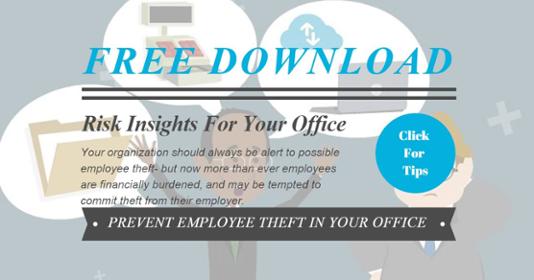What is Fidelity Insurance Coverage?
Insurance companies typically require specific policies, known generally as fidelity insurance, to cover losses by a criminal act of an employee. IT can also be thought of as Employee Theft Insurance or Occupational Fraud Insurance.
I do not have a retail business; do I need Fidelity Insurance Coverage as there is no product to steal?
All organizations are at risk of fraud and theft. While the type of theft can differ, the risk is the same.
- A grocery store may experience more thefts of bottles of while, electronics, pharmacy items, and cleaning supplies.
- A nonprofit may experience fraud via asset misappropriation and financial statement fraud.
- Sales positions could include theft of company information including lead lists and client information.
- Positions that include processing information, including data entry and client services could allow the opportunity for theft of sensitive information the result being identity theft and HIPPA violations.
Are larger organizations more likely to experience theft?
The Association of Certified Fraud Examiners’ Report to the Nation in 2014 reported that a typical organization loses 5% of its revenue each year to employee theft. Unfortunately small businesses bear the brunt of fraud losses with 28% of higher median fraud losses occurring in organizations with fewer than 100 employees.
Does my Fidelity Insurance policy include theft from sub-contractors and independent contractors?
Fidelity insurance provides coverage for the theft of funds committed by employees. This is important to note- as it typically excludes sub-contractors or independent contractors. Endorsements are available to provide additional coverage for thefts by these sub-contractors or independent contractors.
What should I do after employee theft is discovered? What do we need to file a claim?
Many policyholders discover that once theft or embezzlement is discovered, that providing the proof for a claim is additional hurdle that they were not prepared for. This is the case because usually the insured has to prove that the funds or product have actually been stolen, as opposed to misplaced or lost.
Furthermore, some policies will require a conviction for coverage to activate. This stipulation can lead to delays in claims being settled- so while a business can be at their most fragile, waiting on a prosecutor can prove trying for organizations, especially on small businesses.
Which steps can my organization take to reduce the likelihood of employee theft?
Often the creation of policies, internal controls, and audit procedures can be difficult as you may not know where to start. Fortunately, The Association of Certified Fraud Examiners reports that businesses that had anti-fraud controls in place experienced lower fraud losses than organizations without such controls in place.
Are you looking for more information about how your organization can reduce employee theft?
How can I be sure to have complete coverage?
Even if these steps cannot totally negate all employee theft. Proving the actual amount of damages for fidelity losses can be complicated and often requires hiring investigators and forensic accountants. For this reason, companies should consider an additional endorsement that covers claims expenses.
Even companies that do have fidelity insurance, once reviewed are often found to have insufficient limits. The key is to discuss these issues with your broker so that they can structure the coverage you need based on your operations.



